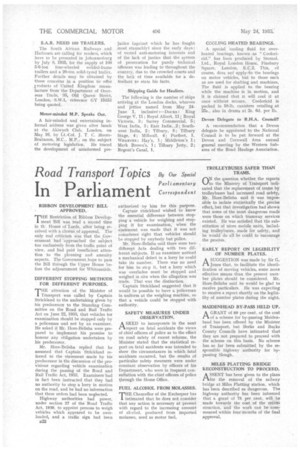Road Transport Topics
Page 40

If you've noticed an error in this article please click here to report it so we can fix it.
In Parliament
By Our Special Parliamentary Correspondent
RIBBON DEVELOPMENT BILL APPROVED.
rrHE Restriction of Ribbon Development Bill was read a second time in th". House of Lards, after being received with a chorus .of 'approval. The
only real criticism was that the ,Gov ernment had approached the subject too exclusively from the traffic point of view, and Had paid insufficient attention to the planning and amenity aspects. The Government hope to pass the Bill through the Upper House before the adjournment for Whitsuntide.
DIFFERENT STOPPING METHODS FOR DIFFERENT PURPOSES.
THE attention of the Minister of Transport was called by Captain Strickland to the undertaking given by his predecessor to the Standing Committee on the Road and Rail Traffic Act on June 22, 1933, that vehicles for examination should be stopped only by a policeman and not by an examiner. He asked if Mr. Ifore-Belisha were prepared to implement his promise to honour any obligation undertaken by his predecessor.
Mr. Hore-Belisha replied that he assumed that Captain Strickland referred to the statement made by his' predecessor in the discussion of the provisions regarding vehicle examination during the passing of the Road and Rail Traffic Act, 1903. Examinershad in fact been instructed that they had no authority to stop a lorry in motion on the road, and he had no information that these orders had been neglected. Highway authorities had power, under section 27 of the Road Traffic Act, 1930, to appoint persons to weigh vehicles which appeared to be overloaded, and a traffic sign had been authorized by him for this purpose. Captain Strickland wished to know the essential difference between stopping a vehicle for weighing and stopping it for examination, when the statement was made that it was not considered right that vehicles should be stopped by anybody but police. Mr. Hore-Belisha said there were two different Acts dealing with two different subjects. H an examiner noticed a mechanical defect in a lorry he could take its number. There was no need for him to. step it, but a lorry which was overladen must be stopped and weighed in situ when the allegation was made. That was the distinction.
Captain Strickland suggested that it would be possible to have a policeman in uniform at the weighing machine, so that a vehicle could be stopped with authority.
SAFETY MEASURES UNDER OBSERVATION.
ASKED to incorporate in the next report on fatal accidents the views of chief officers of police as to the effect on road safety of recent reforms, the Minister stated that the statistical report on fatal accidents was intended to show the circumstances in 'which fatal accidents occurred, but the results of particular safety measures were under constant observation by officers of his Department, who were in frequent consultation with the chief officers of police through the Home Office.
FUEL ALCOHOL FROM MOLASSES.
THE Chancellor of the Exchequer has intimated that he does not consider that any action is necessary at present with regard to the increasing amountof alcohol, produced from imported molasses, used as motor fuel.
TROLLEYBUSES SAFER THAN
ON the question whether the reports' to the Ministry of Transport indjcated that the replacement of trams by trolleybuses had increased road safety, Mr. Hore-Belisha said it was impossible to isolate statistically the precise effect, but that investigation had shown that some of the most dangerous roads were those on which tramway services existed. Ile was satisfied that the substitution of more mobile units, including trolleybuses, made for safety, and he would do all he could to encourage the process.
EARLY REPORT ON LEGIBILITY OF NUMBER PLATES.
A SUGGESTION was made by Sir G.
Jones that, to facilitate the identification of moving vehicles, sonic more effective means than the present number plates should be considered. Mr. Hore-Belisha said he would be glad to receive .particulars. He was expecting to receive a report shortly on the legibility of number plates during the night.
MAIDENHEAD BY-PASS HELD UP.
AGRANT of 60 per cent, of the cost of a scheme for by-passing Maidenhead has been offered by the Minister, of Transport, but Berks and Bucks County Councils have intimated that they are not prepared to proceed with the scheme on this basis. No scheme has so far been submitted by the responsible highway authority for bypassing Slough.
MILES PLATTING BRIDGE RECONSTRUCTION TO PROCEED.
ASSENT has been given to the plans for the removal of the railway bridge at Miles Platting station, which has been described as dangerous. The highway authority has been informed that a grant of 75 per cent, will be made towards the cost of the reconstruction, and the work can be commenced within four-months of the final ,approval.




































































































